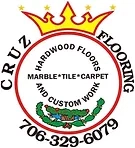Popular Types of Flooring
There's a flooring material for every design preference and price point. In this section, we'll break down the most common types.
Hardwood Flooring
The appeal of hardwood floors stands the test of time. With shades including oak, cherry, maple, walnut, and more, it can fit any design without sacrificing durability. Despite its allure, hardwood comes with a higher price tag. You also need to follow a consistent refinishing schedule every few years, filling in the gaps with specialty wood cleaners. The more time you invest in maintenance, the longer your floors will last.
Engineered Wood Flooring
Engineered wood gives you the charm of hardwood without the extra maintenance. They use a plywood foundation with a layer of real hardwood on top – ultimately saving you money. While it's more resistant to warping versus true hardwood, it can sound hollow to walk on and can't be refinished more than once.
Laminate Flooring
Laminate is another more affordable flooring option, consisting of a particleboard base, wood or tile finish, and protective plastic coating. It's easy to clean, scratch-resistant, and available in countless different colors and styles. However, it chips easily and is susceptible to moisture damage.
Vinyl Flooring
Vinyl flooring has excellent water and fading resistance and requires minimal upkeep. Popular options include luxury vinyl plank (LVP) and luxury vinyl tile (LVT), with both having equal strength and long-lasting nature depending on the model you buy. Their price point sits comfortably between wood and laminate.
Tile Flooring
Tile flooring is perfect for bathrooms, kitchens, and other moisture-prone areas. It provides years of life with little need for maintenance, and is available in many materials, colors, and patterns. However, it might not work well for bedrooms and living rooms since it's colder and more slippery to walk on. Pricing fluctuates between styles, with porcelain carrying a higher price tag than ceramic.
Stone Flooring
Stone floors are among the most waterproof available. You can choose from a variety of bold design options, including sandstone, granite, travertine, and marble. Despite its unique flair, it's not easy to clean, and long-term maintenance could be a bit more expensive.
Linoleum Flooring
Linoleum is made from cork and linseed oil and can endure for decades if cared for properly. It’s a cost-effective option with many design possibilities. However, the softer material is easier to damage, and it's known to discolor with sun exposure. It’s also not suitable for moisture-prone spaces like kitchens and bathrooms.
Carpet
Carpet is the most affordable flooring option. It can make a space feel more comfortable and is great for muffling sound. You don’t have to worry about scratches or dents, and the cushioning makes it a safer choice for young children. However, the fibrous material easily retains odors, stains, and moisture, which isn't ideal for pet owners or allergy sufferers.
How to Choose a Columbus Flooring Company
Choosing a floor installer is just as significant as choosing a design. To ensure you get the most value, consider each of the following criteria.
Reputation and Reviews
The first thing to note is whether a company is known for good service and high-quality work. Check review sites like the Better Business Bureau (BBB), Yelp, Trustpilot, and Google to see what previous clients have to say. Every flooring installer will have a mix of praise and criticism online. If a company addresses issues in a constructive and satisfactory way, it's generally a good sign. However, if you find more negative reviews than positive ones, it's better to steer clear.
Portfolio and References
Most floor installers keep portfolios of their proudest projects. We recommend requesting a copy so you can inspect the crew's workmanship. Portfolios might also include references from past customers. Request their contact information so you can discuss their interactions and thoughts about the company.
Specialization and Services
No two companies have the same experience or product offerings. You should find one that specializes in the material or type of floor you're interested in. Equally important is an installer's service offerings. At the very least, it should offer cleanup and haul-away for your old flooring materials. However, if you're feeling lost in all the color, style, and material choices, you can also look for contractors with design teams.
Cost
Cost is vital to consider, but it should be less important than quality in your decision-making process. We recommend getting three to five different quotes for your flooring job to compare pricing and workmanship. Many companies offer on-site and online estimates to ease the process.
Warranties and Guarantees
You should look for two different warranties in your company search. A manufacturer's warranty protects you in case of a product defect, while an installer's warranty covers workmanship. Depending on the installer and flooring brand you select, warranty coverage could be limited to a fixed term. In other instances, it lasts for the life of the floor. Ask a company about its warranty terms, including extensions that could give you additional coverage.
Estimated Timeline
You don't want your flooring project to last longer than expected. Request an estimated timeline up-front and ask about potential delays. Communicate your expectations clearly and secure any guarantees in writing.
Ready to Get a Quote on Your Flooring Project?
Please enter a valid 5-digit zip code!
Frequently Asked Questions About Flooring in Columbus
How much will it cost to install a new floor in Columbus?
See our guides to how much each flooring type typically costs:
What are some of the most popular types of flooring in Columbus?
Do Columbus flooring companies need to be licensed?
How do I decide which flooring material is right?
Other questions to consider are the following:
- Does the room see a lot of moisture or foot traffic?
- What style best compliments my walls, furniture, and millwork?
- What are the long-term benefits of choosing one material over another?
What are the telltale signs I need to replace my floor?
- Widening gaps between planks/tiles
- Severe mold or mildew growth
- Deep dents, scratches, or holes
- Patches that feel unstable
- Excessive squeakiness
- Water damage
To share feedback or ask a question about this article, send a note to our Reviews Team at reviewsteam@thisoldhousereviews.com.


















